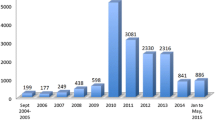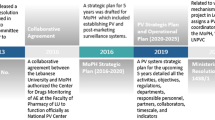Abstract
Many Pacific Island countries (PICs) are recipients of funding support from the Global Fund to Fight AIDS, Tuberculosis and Malaria (Global Fund). However, most of these countries cannot be expected to meet Global Fund and World Health Organization (WHO) minimum requirements for a functioning pharmacovigilance (PV) system. We argue that a different approach is required to move PV forward in such countries. Although the long-term aim is to build adequate national PV capacity, we propose an approach in which resources are focused initially towards ensuring a proper system for the reporting of “problems with medicines” such as substandard and counterfeit products. The limited health system resources in these countries require that PV will be supported by some of the organizations also giving funding aid for the supply of medicines.
Similar content being viewed by others
References
The Global Fund. Funding model: allocations 2014–2016. http://www.theglobalfund.org/en/fundingmodel/allocationprocess/allocations/. Accessed 2 Apr 2016.
The Global Fund, World Health Organization. Minimum requirements for a functional Pharmacovigilance System. http://www.who.int/medicines/areas/quality_safety/safety_efficacy/PV_Minimum_Requirements_2010_2.pdf. Accessed 21 Mar 2016.
Asian Development Bank. Key indicators for Asia and the Pacific. 44th edition. Mandaluyong City, Philippines; 2013:203.
Republic of Vanuatu. Ministry of Education and Training. 2013 Annual Statistical Digest (ASD). http://www.vnso.gov.vu/index.php/component/advlisting/?view=download&fileId=2181. Accessed 8 Apr 2016.
Escalante S, McEwen J. National policies for safety of medicines in the Asia-Pacific region. WHO South East Asia J Public Health. 2013;2:118–20.
Brown A, Gilbert B. The Vanuatu medical supply system-documenting opportunities and challenges to meet the Millenium Development Goals. South Med Rev. 2010;5(1):14–21.
Hetzel MW, Page-Sharp M, Bala N, et al. Quality of antimalarial drugs and antibiotics in Papua New Guinea: a survey of the health facility supply chain. PLoS One. 2014;9(5):1–10.
Hagstrom A. Asia Pacific training. Upps Rep. 2015;69:17.
Olsson S. UMC redesignation. Upps Rep. 2013;62:114.
Uppsala Monitoring Centre. Being a Member of the WHO Medicines Safety Programme. http://www.who-umc.org/DynPage.aspx?id=98081&mn1=7347&mn2=7252&mn3=7322&mn4=7325. Accessed 24 Mar 2016.
Uppsala Monitoring Centre. Being a member of the WHO Programme for International Drug Monitoring. http://www.who-umc.org/graphics/28121.pdf. Accessed 24 Mar 2016.
WHO Programme News. Papua New Guinea. Upps Rep. 2013;61:47.
Xueref S. The Global Fund to fight AIDS, TB and Malaria: an opportunity to strengthen pharmacovigilance systems in beneficiary countries. WHO Pharm Newslett. 2012;5:15–7.
Xueref S, Daviuad J, Pal S. The Global Fund and pharmacovigilance systems in resource limited settings. Lancet. 2013;381:1360.
Report of the TRP on concept notes submitted in the third and fourth windows of the funding model. February 2015; 25. http://www.theglobalfund.org/documents/fundingmodel/reports/FundingModel_ConceptNotes-Windows-03-04-TRP_Report_en/. Accessed 21 Mar 2016.
Pandit J, Kusu N. Electronic reporting launched in Kenya. Upps Rep. 2013;62:11.
Jajere F. Rapid consumer reports. Upps Rep. 2014;65:16.
Author information
Authors and Affiliations
Corresponding author
Ethics declarations
The authors alone are responsible for the views expressed in this Current Opinion.
Funding
No sources of funding were used to assist in the preparation of this Current Opinion.
Conflict of interest
John McEwen advised the Ministry of Health, Vanuatu about PV (2011). Lasse S. Vestergaard has served as a Medical Officer for the WHO in Vanuatu, 2009–2012, and for the WHO Western Pacific Regional Office in the Philippines, 2012–2015. Amanda Sanburg served as a Principal Pharmacist at the Ministry of Health in Vanuatu, 2003–2006 and 2012–2014. She is currently a contracted adviser to the current principal pharmacist. The authors have no other competing interests.
Rights and permissions
About this article
Cite this article
McEwen, J., Vestergaard, L.S. & Sanburg, A.L.C. Pacific Island Pharmacovigilance: The Need for a Different Approach. Drug Saf 39, 891–894 (2016). https://doi.org/10.1007/s40264-016-0439-4
Published:
Issue Date:
DOI: https://doi.org/10.1007/s40264-016-0439-4




